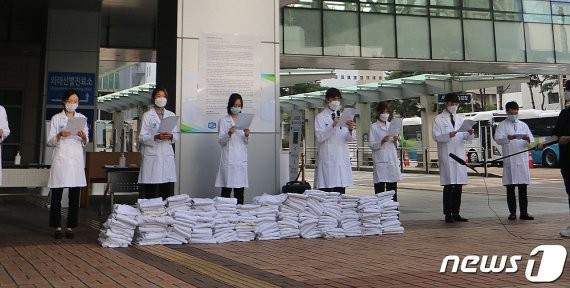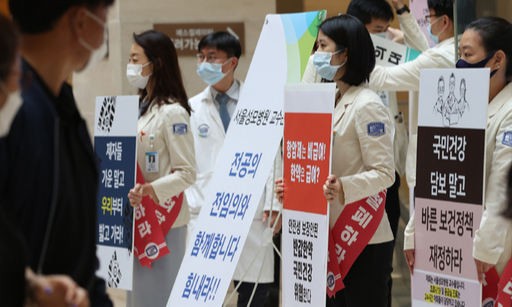The government of Korea is planning on increasing the admission quotas for medical schools, for the first time since 2006. The government intends to increase the number of professionals specializing in infectious diseases, pediatric surgery, epidemiological investigations, however their main goal is to enhance the medical infrastructure of provincial areas. While I agree that the medical infrastructure in provincial areas needs development, I am opposed the planned medical reform because it hasn’t taken into consideration the legitimate concerns raised by the medical profession.
The Korean Medical Association (KMA) reacted strongly against the government plan with doctors launching a strike on August 14 in protest. Their actions were joined by medical students who decided to boycott the state licensing exam and school classes in protest.
 |
| ▲ The residents took off their white doctor's gown. (Photo from NEWS 1) |
The government’s position is based on the fact that that the number of doctors per capita in Korea is low in comparison to other Organization for Economic Cooperation and Development (OECD) nations. However, I believe that the problem is not found in the number of physicians, but rather in the need for an overhaul in the current medical infrastructure that will address shortages in medical services, especially those in rural areas. Yes, Korea has fewer doctors per capita as compared to the average number of doctors in OECD nations, however Korea is third in the world in the density of doctors with 10.44 per 10km². This means that many doctors are concentrated in small areas. In contrast, Greece has the highest number of doctors in the world, but Greece is struggling with a medical problem because many general practitioners are concentrated in a metropolis. Furthermore, as the population decline accelerates, it is estimated that the number of doctors per capita will naturally overtake the average number of physicians in OECD nations by 2028.
The number of doctors in Seoul is 3.1 per 1,000 people and the number of doctors in Sejong is 0.9 per 1,000 people, revealing a considerable gap between the two regions. However, I do not think the proposed medical reform will bridge the gap between the regions in the long term. Even if doctors fulfill a 10-year mandatory period in remote less populated areas, they will eventually would move to the capital. Also, it is hard to expect local doctors to specialize in the same majors meaning the planned medical reform will have no long-term effect.
The problem of unpopular fields of study such as the maternity unit and cardiothoracic surgery, is not the number of doctors, but rather that physicians in those field do not make a lot of money because of the low costs of medical treatment and the high risk of mortality in comparison to other medical fields. Hospitals large enough to bear this risk are mainly university hospitals. There are many workplaces for residents who major in a cardiothoracic surgery, but few hospitals have positions for specialists because they are simply not profitable services for a hospital. So, the solution is not increasing the number of doctors, but rather changing the system so that hospital can earn a profit when offering this type of specialized medical treatment.
 |
| ▲ The professors are picketing to support the residents and the general practioners. (Photo from Yonhap News) |
Furthermore, local doctors should not be forced to study undesirable subjects as it will only result in a poor quality of medical services. For instance, army doctors are forced to serve in military hospitals, so the quality of medical care is low in comparison to hospitals where doctors choose to practice. The quality of medical care in public medical schools would be low for the same reason. The KMA also cited a report from the National Health Insurance Service that stated an increase in the number of doctors would result in an increase overall medical expenses and health insurance premiums. The intensified competition among doctors to bill for services will result in unnecessary medical treatment to generate greater profits. In addition, it costs the government two to three hundred million won to train a public doctor meaning the total cost for the planned increase would be more than one trillion won, which would exhaust health care insurance finances leaving the government no choice but to increase health insurance premiums and the cost of the medical service fees.
I strongly suggest the government abandon its plan and instead sit down with the KMA to develop appropriate countermeasures that would address the very concerns the government is attempting to resolve. Pushing through the proposed policy as is will only cause unnecessary disruptions in the health care system. The KMA has suggested instead the normalization of charges for medical treatments and argued that epidemiological investigators should come from the exiting pool of physicians rather than require a specialized discipline. They have also argued that a separate education for different divisions such as infectious diseases and major trauma is cost prohibitive. Due to this on-going dispute, many patients are afraid their surgeries may be cancelled. If the strike lasts much longer, the country may be facing a national emergency. For this reason, it is imperative that the government abandon its plans and find a way to reach an agreement with the KMA as soon as possible.
박소현 dankookherald@gmail.com

![[Campus Magnifier] Let's Surf the Library!](/news/photo/202404/12496_1765_4143.jpg) [Campus Magnifier] Let's Surf the Library!
[Campus Magnifier] Let's Surf the Library!
![[Campus Magnifier] Let's Surf the Library!](/news/thumbnail/202404/12496_1765_4143_v150.jpg)





